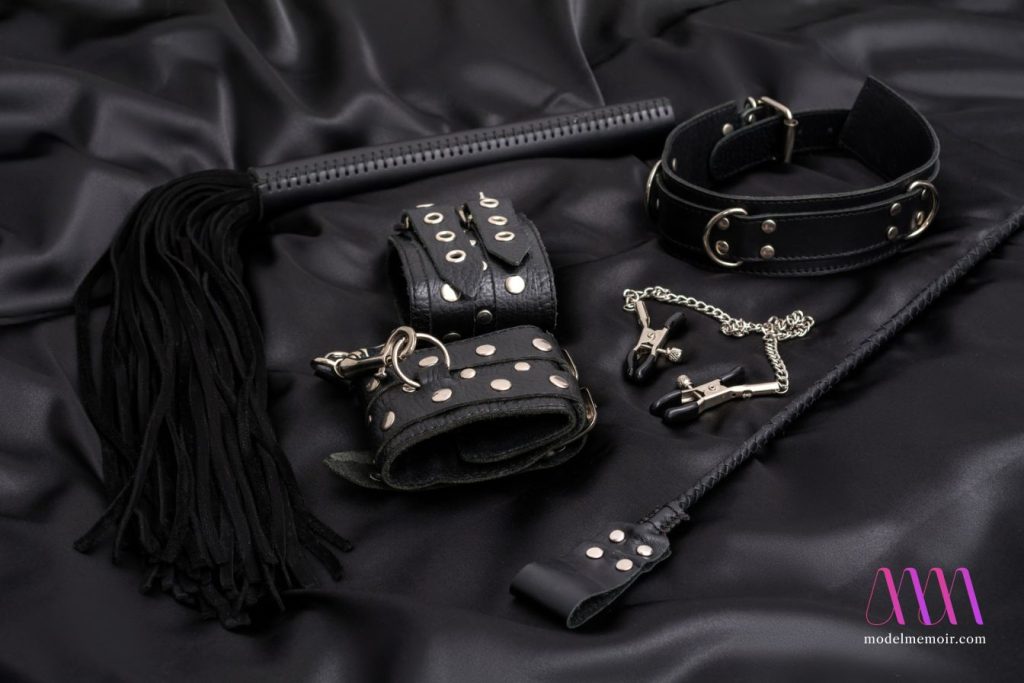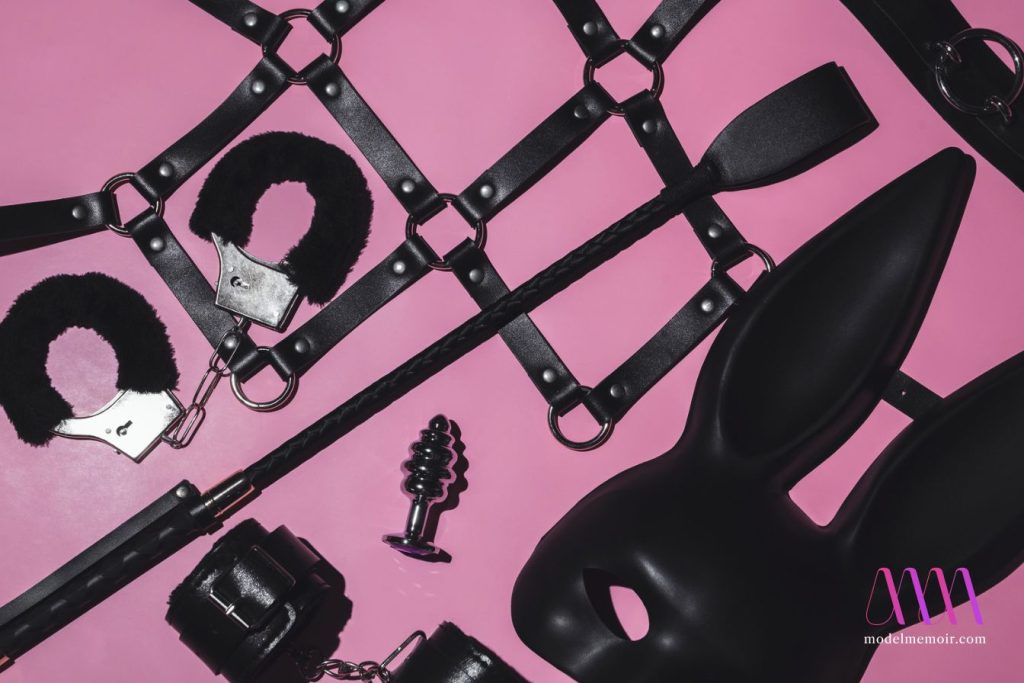Ever feel like your love life could use a little more… edge? Well, grab those velvet cuffs and get comfy, ‘cause we’re about to enter the exciting world of BDSM toys! No need for leather catsuits or red rooms just yet—this guide’s all about starting slow and safe, with toys that are perfect for beginners looking to dip their toes (or, well, other things) into something new.
From feathery ticklers that’ll make your skin tingle to gentle restraints that’ll have you letting go in all the best ways, we’re going to break down the basics and take you step-by-step through the kinkiest aisle of the toy store.
Whether you’re flying solo or spicing things up with a partner, these starter toys are designed to bring out your inner thrill-seeker—no experience required.
So, ready to unlock a new side of pleasure? Let’s get into the fun stuff, and remember: boundaries are essential, safe words are non-negotiable, and the thrill is just getting started.
Before we dive into the naughty details, let’s take a peek at the table of contents.
What is BDSM and why try it?
So, you’re curious about BDSM, huh? Whether it’s the allure of adventure, a chance to spice things up, or just plain ol’ curiosity, there’s plenty of reason to dive into the world of Bondage, Discipline, Dominance, Submission, Sadism, and Masochism (yep, that’s what the letters stand for!).
But don’t worry—just because there’s an alphabet soup of intense-sounding words doesn’t mean you need to be a pro. Let’s break it all down, starting with the basics.

Bondage
Bondage is all about tying things up—and nope, we’re not talking about your work emails. From silky scarves to sturdy cuffs, bondage can be as light or intense as you want. The thrill? Giving up (or taking) control, even if it’s just with a blindfold or gentle wrist tie. Think of it as foreplay with a twist—and a few extra knots. 🪢
Discipline
Now, here’s where things get spicy. Discipline is a playful practice in setting rules and seeing if they’ll be followed. It’s about establishing boundaries and rewards or punishments (think playful spanks or cheeky praises) if those “rules” aren’t followed.
The key? It’s all in good fun and builds anticipation… because, let’s be honest, who doesn’t love a little suspense?
Dominance and Submission (D/s)
Dominance and Submission, or D/s, is the heart and soul of BDSM for many. It’s the dynamic between “who’s in charge” and “who’s following along.” The Dominant is the leader, setting the scene and guiding the experience, while the Submissive lets go and follows their lead.
Don’t be fooled—submitting isn’t about being weak; it’s about trust, teamwork, and maybe a few well-timed commands. If you’re feeling curious, just dip your toes in and see if you prefer calling the shots or following them. 📜👑
Sadism and Masochism (S&M)
Sadism and Masochism, or S&M, can sound intimidating, but it’s really about enjoying different types of sensation—think playful spanking, light bites, or gentle scratches. For those on the Sadism side, it’s about taking pleasure in giving sensation. Meanwhile, Masochism is all about enjoying the experience of receiving it.
For beginners, start small—maybe a feather tickler or a soft paddle—and see if a touch of intensity adds a spark to the night. It’s about sensation, connection, and maybe even a few playful yelps (the good kind, of course 😉).
Myths vs. reality – debunking common misconceptions about BDSM
Alright, let’s clear the air! BDSM has had its fair share of myths, misunderstandings, and downright wild tales (thanks, Hollywood!).
But don’t worry—you don’t need a dungeon or a leather wardrobe to enjoy a little spice.
Let’s bust through some of the biggest myths so you can jump in with an open mind and maybe a smile.

Myth #1: BDSM is all pain, no pleasure
Reality: BDSM is all about pleasure.
Sure, some people like a little (or a lot) of sensation, but it’s not just about pain. BDSM can involve soft touches, gentle ties, feather ticklers, and anything that feels good for you and your partner. Think of it as adding a few extra flavors to the mix. Spice levels vary!
Myth #2: You need to go “all in” or it’s not “real” BDSM
Reality: BDSM is as flexible as you want it to be (just like those fun little restraints). You don’t need to dive into extreme practices to enjoy it.
Light bondage, a hint of dominance, or even a playful spanking can count as BDSM. Go at your own pace—there’s no “right” way to play, and you don’t need to follow anyone else’s script.
Myth #3: You have to be “a certain type” to enjoy BDSM
Reality: If you’re curious and open-minded, you’re already the “right type”! BDSM isn’t about personality types or lifestyles; it’s about curiosity and connection.
No need to fit a mold—whether you’re a librarian by day or a rockstar at heart, there’s a BDSM style that can work for you.
Myth #4: BDSM is dangerous and requires crazy equipment
Reality: BDSM doesn’t need chains, whips, or anything you’ve seen in a movie. Most beginner toys are simple and safe, like silk ties, soft blindfolds, and small paddles.
And it’s only dangerous if people don’t communicate—so talk it out with your partner, agree on boundaries, and always use safe words. Safety is sexy, folks!
Myth #5: Once you start, you’re “locked in”
Reality: BDSM is not an all-or-nothing deal. You can dip your toes in, explore a little, and step away anytime. It’s about adding fun, not pressure. Just because you enjoy a light spanking one day doesn’t mean you’re signing up for a lifetime of latex and leather.
BDSM is here for you when (and if) you want it.
Now that we’ve got the myths out of the way, let’s dive into why BDSM can be so rewarding. Beyond just adding a bit of thrill, there are some real perks to exploring BDSM that go way deeper than the surface. Ready to find out what makes this experience truly special?

The benefits of exploring BDSM – building trust, enhancing pleasure, and boosting self-confidence
Alright, let’s talk about why so many people are drawn to BDSM. Spoiler: it’s not just for the thrill! Exploring BDSM has a few hidden perks that make it more than just another way to spice up your love life.
When done right, BDSM can build trust, bring you closer, and even give you a little self-confidence boost. Here’s how:
Building trust
BDSM might sound intense, but it’s one of the most trust-focused experiences out there. When you’re exploring boundaries, trying new sensations, or even giving up control (or taking it!), you and your partner have to trust each other completely.
It’s a partnership where communication, boundaries, and honesty are key—basically, the ultimate trust-fall exercise… but way more fun.
Enhancing pleasure
Let’s get one thing straight: BDSM isn’t about enduring—it’s about enjoying! Trying out BDSM toys, like silky restraints or tickling feathers, lets you explore different ways of feeling pleasure.
Maybe it’s a new sensation, like the thrill of a gentle spanking, or just the excitement of trying something totally different. Plus, focusing on different types of touch and intensity can make your usual go-to moments feel even more electric.
Boosting self-confidence
Believe it or not, BDSM can be a huge confidence booster. Exploring what you like, communicating openly, and (let’s be real) rocking some bold new experiences can make you feel more in tune with yourself.
Whether you’re taking control or letting go, you’re getting to know your desires and boundaries, which can make you feel more empowered in and out of the bedroom.
So, if you’re looking for a way to deepen connection, ramp up pleasure, or just feel like a boss, BDSM might be your new best friend. It’s all about trusting yourself and your partner, and having some memorable fun along the way!
Safety first: setting boundaries and communicating
Alright, before we jump into the fun stuff, let’s talk safety. BDSM may be about exploring new sensations and dynamics, but it’s also deeply rooted in trust, consent, and communication.
Setting clear boundaries, using safe words, and checking in with each other are all essential parts of the experience.
Think of it as the solid foundation that lets you really enjoy every moment, knowing you’re both on the same page. Here’s how to make sure you’re both feeling comfortable, confident, and ready for anything.

Consent and safe words – how to establish and respect limits
First things first: consent.
BDSM without clear, enthusiastic consent is a no-go. It’s like putting up the bumpers at a bowling alley—those boundaries keep everyone having a good time. Talk openly with your partner about what you’re interested in and what’s off-limits.
Once you’ve set the stage, establish a safe word. A safe word is your “pause button” if things get a little too intense or if you just need a breather.
Choose a word that’s easy to remember and unlikely to come up by accident. (Let’s face it, “banana” is a lot easier to call out than “no.”) And here’s the golden rule: if the safe word comes up, stop immediately. Think of it as a trust-building exercise that shows you’re looking out for each other’s comfort as much as their pleasure.
Importance of aftercare – the essential step for a positive experience
Aftercare is like the comfy blanket after a thrilling rollercoaster ride. Once the excitement wraps up, both partners need a moment to come back to reality and check in with each other.
Aftercare can be a simple hug, a glass of water, or just lying together and talking about how things felt. It helps soothe any lingering intensity and keeps the connection strong, making sure both partners feel grounded and good about the experience.
And remember, aftercare isn’t one-size-fits-all. For some, it’s cuddling; for others, it might just be a few minutes of quiet. The goal? Reconnect, refresh, and make sure everyone’s on cloud nine.
Communicating with a partner – how to talk openly about desires, boundaries, and concerns
Communication is the heart and soul of a good BDSM experience. If you’re feeling curious about something or if something feels a bit too much, say it! Letting your partner know what you want (or don’t want) ensures you’re both on the same page. Share your boundaries, desires, and any concerns before things get spicy.
A quick check-in can make a world of difference, so don’t be shy. Remember: this is all about exploring together, and open communication makes it that much more enjoyable. Think of it as your secret recipe to a fun, safe, and unforgettable adventure.

Choosing your first BDSM toys
So you’re ready to add some extra flair to your bedroom with a few beginner-friendly BDSM toys? Great choice! The world of BDSM toys might seem like a wild wonderland, but there are plenty of gentle, inviting options perfect for newbies.
Whether you’re into a little light bondage or just want to try something new with your partner, here’s a guide to get you started.
Bondage basics – intro to beginner-friendly restraints like cuffs, silk ties, and bed restraints
Bondage doesn’t have to be intimidating—in fact, it’s one of the most approachable parts of BDSM. Light restraints add a little bit of excitement without needing a dungeon setup! For beginners, bondage toys like handcuffs, silk ties, and bed restraints are perfect for easing into the experience.
- Handcuffs – Classic, sturdy, and secure, handcuffs bring an undeniable thrill. They lock you (or your partner) in place with a satisfying click and give a sense of total surrender. Many beginner cuffs come with soft padding, so you don’t have to worry about any uncomfortable chafing. Handcuffs are easy to use, but they do come with a bit of commitment, as they hold wrists firmly in place. Make sure you have the key handy—and maybe a spare if you tend to lose things!
- Silk ties – If you’re looking for something a little softer and less restrictive, silk ties are a fantastic option. They’re versatile, adjustable, and bring a luxurious, sensual feel to bondage play. Ties can be used to secure wrists, ankles, or even as a blindfold. Plus, they’re easy to release in case you or your partner want a quick escape. Silk ties are ideal for a relaxed introduction to bondage because they offer control without feeling too intense.
- Bed restraints – These are a step up in setup but add an extra thrill to your play. Bed restraints can be adjusted to fit most beds, giving you (or your partner) the feeling of being “locked in” without needing anything extreme. Think of them as the beginner’s version of a full-body experience—just attach, adjust, and let the fun begin. Bed restraints are secure but adjustable, allowing for movement while keeping things in check.

Handcuffs vs. silk ties – pros and cons of different restraint types
Now, you might be wondering: should you go for handcuffs or keep it smooth with silk ties? Here’s a quick rundown to help you choose:
- Handcuffs
- Pros: Strong, secure, and instantly recognizable as a classic bondage tool. Easy to use and lock.
- Cons: Can feel a bit intense for beginners and require a key. Might be uncomfortable without padding.
- Best for: Those who want a more “locked-in” experience with a firm hold.
- Silk ties
- Pros: Soft, flexible, and super beginner-friendly. Easy to tie and untie without a key.
- Cons: May not feel as “secure” as handcuffs for those wanting a stronger hold.
- Best for: Those who want a gentler, more versatile option with easy escape options.
Sensory play tools – options like blindfolds, feather ticklers, and massage candles
Ready to add a little mystery and spark to your playtime? Sensory play is all about enhancing the senses, and a few carefully chosen tools can turn a regular night into a feast of new sensations.
Sensory play toys like blindfolds, feather ticklers, and massage candles are perfect for beginners. Each one brings something unique to the experience, so let’s explore what they have to offer.
Blindfolds and the thrill of mystery – enhancing sensations by limiting sight
Nothing says “get ready for surprise” quite like a blindfold. By covering the eyes, you take away the sense of sight, making every touch feel heightened. Suddenly, a gentle caress feels like an adventure, and every sound adds to the anticipation.
Plus, when you can’t see, your imagination runs wild—hello, suspense!
Blindfolds are also super versatile. You can use anything from a satin sleep mask to a scarf tied gently around the head. Just make sure it’s soft and comfortable, so it feels like a treat rather than a trick.
For beginners, blindfolds are a great way to ease into sensory play without diving into anything too intense. Just one simple item, and you’re ready for a night of mystery and delight.
Feather ticklers and light touch tools – great for easing into sensory play
If you’ve ever felt the light, ticklish touch of a feather across your skin, you know it can send shivers down your spine—in the best way possible. Feather ticklers are ideal for anyone new to sensory play because they’re all about light, gentle touches that tease the skin and heighten arousal without overwhelming.
A feather tickler is easy to use: simply drag it lightly over your partner’s arms, legs, or anywhere they’re ticklish (with consent, of course!). You can also experiment with different levels of pressure, from a barely-there brush to a more focused touch.
It’s a great way to explore each other’s sensitivity and see what kind of sensations really get the blood pumping. And let’s be real, a little bit of teasing can go a long way toward building anticipation.

Massage candles – combining warm oil with a sensual massage
Imagine this: the soft glow of candlelight, a warm touch on your skin, and a hint of fragrance in the air. Massage candles bring a whole new level of indulgence to sensory play.
Here’s how they work: you light the candle, let it burn for a few minutes, and once it melts a bit, blow it out and pour the warm, melted wax (which doubles as massage oil) onto your partner’s skin.
The warmth from the oil feels incredible, especially on tense muscles, and the scent adds an extra layer of sensory pleasure. Massage candles are perfect for those who want to explore sensory play without anything too intense.
Just make sure you’re using a candle specifically designed for this—regular wax can be too hot and isn’t safe for skin contact. With the right candle, you’ll be giving each other a cozy, intimate experience that’s equal parts relaxing and exciting.
Impact play for beginners – intro to safe, light tools like paddles and floggers
If you’re curious about trying impact play, you’re in for a thrilling treat! Impact play is all about exploring different types of touch—like gentle spanks, taps, and even playful thwacks.
While it may sound intense, it can be as light or as playful as you want. For beginners, tools like paddles and floggers are perfect starting points because they’re easy to control and offer a range of sensations. Ready to make an impact? Let’s jump in!
Choosing a paddle – different materials and their effects
When it comes to paddles, there’s more variety than you might expect! The material of the paddle can make all the difference in terms of sensation, weight, and the type of “impact” it brings to the experience. Here’s a quick rundown of popular options:
- Leather paddles – Leather has a satisfying weight and provides a rich, thuddy feel. It’s firm but forgiving, offering a gentle yet noticeable impact. Leather paddles also have a luxurious look and feel, making them a favorite for those who want a classic vibe.
- Wooden paddles – Wooden paddles are solid and can pack a slightly stronger punch than leather, so they’re perfect if you’re ready for a more defined sensation. They’re smooth, easy to handle, and bring a firm touch that’s still manageable for beginners—just make sure to start with light taps and work your way up!
- Silicone or rubber paddles – These paddles are super flexible and give a nice, springy feel. Silicone and rubber paddles are great for those who prefer a gentler, stingier sensation. Plus, they’re easy to clean and maintain.
For newbies, start with a leather or silicone paddle to get a feel for the different sensations. Go slow, and take turns trying out different areas to find what feels best. Remember, it’s all about creating an experience that’s comfortable and enjoyable for both of you.

Light floggers – texture, weight, and why softer is better for newbies
Floggers are another fantastic option for impact play, especially if you’re after a tool that offers variety in texture and weight.
A flogger is a bundle of soft or firm “tails” attached to a handle, creating a unique sensation that’s very different from a paddle. For beginners, light floggers are the way to go—they’re designed for a gentler impact, giving you control over how much intensity you want.
- Material and texture – Floggers come in materials ranging from suede to leather to rubber. Suede floggers are softer and provide a luxurious, teasing feel, while leather has a bit more weight and adds a thuddier sensation. Suede is especially great for those who want to keep things light and avoid anything too intense.
- Weight and size – A lighter flogger with shorter tails is easier to handle and provides more control, so it’s ideal for newbies. It allows you to experiment with soft swings and gentle taps, creating a fun, feathery sensation on the skin.
Floggers are versatile—you can use them for soft, tickling strokes or a bit more pressure for those who crave a touch more intensity. Start with a lighter flogger to get comfortable, and explore different areas like the back, thighs, or even arms. And don’t forget to communicate and check in frequently to make sure everything feels just right.
How to prepare for your first BDSM session
Ready to set the stage for your first BDSM adventure? Amazing! Preparing for a session is all about creating the right atmosphere, checking your toys, and making sure you’re both on the same page.
This isn’t just about tossing on some lingerie and hoping for the best—it’s about building trust, getting in the mood, and having everything lined up for a night that’s unforgettable (for all the right reasons). Here’s how to get ready to play with confidence and excitement!

Setting the mood – creating a comfortable, safe, and private space for your “BDSM party”
First things first: setting the mood is crucial. You want a space where you both feel comfortable, relaxed, and, of course, a little excited. Think dim lighting, maybe a few candles, and some music that sets the vibe—something sensual but not distracting (no one wants to be mid-spank and suddenly get thrown off by a loud guitar solo).
Make sure the space is free of interruptions, too—phones on silent, and maybe lock the door if you need that added peace of mind. Whether it’s your bedroom, living room, or even a cozy nook you’ve set up, create a scene that invites you both to let go and enjoy each other.
Checking your toys – tips on making sure all equipment is ready and safe to use
Now, let’s talk toys. Before you dive in, you’ll want to do a quick “gear check” to make sure everything is clean, working, and ready for action. If you’re using restraints, make sure the buckles or ties are smooth and don’t have any rough edges that could dig in. Handcuffs?
Double-check you have the keys handy (no one wants to be stuck making an awkward call to a locksmith mid-session).
For toys like paddles or floggers, test the weight and feel so you know what to expect. If you’re working with something a bit more advanced, like a vibrator or a remote-control toy, make sure it’s charged up and ready to go.
Basically, treat it like a pre-flight check to make sure you’re all set for takeoff.
Establishing a pre-session checklist – consent, safe words, and comfort level check-ins
Alright, now for the pre-session talk. This might not sound super “sexy,” but trust us—it’s the key to making sure everything goes smoothly. Here’s your basic checklist:
- Consent – This is the foundation of any good BDSM experience. Talk openly with your partner about what you’re both comfortable trying and where you’d like to start. Maybe tonight is just about experimenting with light spanking and a blindfold. Whatever it is, make sure you both agree enthusiastically.
- Safe words – Choose a safe word that’s easy to remember and doesn’t sound like something you’d normally say in bed. “Banana,” “red light,” or even “unicorn” work well—just something that stands out and signals an immediate stop. And here’s the golden rule: when the safe word comes up, everything stops.
- Comfort level check-ins – Establish a system to check in throughout the session. For example, “green” means “all good, keep going,” “yellow” means “slow down a bit,” and “red” means “stop immediately.” This lets you communicate without breaking the flow.
A quick conversation about boundaries and desires helps both of you feel relaxed and confident going into the session. When you’re both clear on what to expect, you can let loose and enjoy yourselves without any worries.

How to use beginner-friendly BDSM toys
So you’ve got your toys ready, the mood is set, and you’re all warmed up for a little playful exploration.
Starting with light bondage, like wrist or ankle restraints, is a fantastic way to ease into BDSM without feeling overwhelmed. It’s all about giving up (or taking!) a bit of control, with a playful edge that keeps things fun and flirty.
Let’s dive into how to use restraints to bring a whole new thrill to your time together.
Getting comfortable with bondage – starting small with wrist or ankle restraints
When you’re new to bondage, simpler is often better. Wrist or ankle restraints are the perfect “starter pack” for exploring light bondage without needing any wild skills or advanced techniques. These restraints come in all forms, from soft cuffs that feel cozy against the skin to adjustable straps that give just enough hold without being too intense.
- Start with comfort – The key is to make sure the restraints feel secure but not too tight. Go for something that’s padded or lined if you’re worried about any discomfort. Some beginner-friendly restraints even have Velcro, making them super easy to adjust and remove if needed.
- Decide who’s in control – Bondage is all about a power exchange, so decide ahead of time who’s taking the lead. If you’re the one being restrained, take a moment to relax into the experience and trust your partner. If you’re the one in control, use this chance to be extra attentive, teasing with light touches or whispers to build anticipation.
- Experiment with positions – Restraints aren’t just for lying down! Try sitting up or even standing against a wall to see how different positions change the feel of the experience. Whether it’s hands above the head or wrists tied to the bedposts, different setups can lead to new sensations and dynamics.
- Add a blindfold for extra excitement – Want to dial up the thrill? Add a blindfold along with the restraints. When one sense is taken away, the other senses become heightened, making every touch feel just a little more intense. It’s a great way to mix in a bit of mystery and anticipation.

Tips for sensory play – how to use blindfolds and ticklers to enhance sensation
If you’re looking to dive into the world of sensation play, blindfolds and ticklers are the ultimate tools for building anticipation and turning up the thrill. Sensory play is all about heightening one sense by gently limiting another, creating a rollercoaster of touch, temperature, and texture. Here’s how to get the most out of these beginner-friendly toys:
- Start with a blindfold – Covering the eyes with a soft, comfortable blindfold (a satin sleep mask or scarf works well) amps up every other sensation. Without sight, your partner won’t know exactly when or where the next touch will land, making every caress feel like a surprise. Plus, the anticipation alone can be thrilling.
- Add a feather tickler – Once your partner is blindfolded, take a feather tickler or a soft brush and start with light strokes across their skin. Run it along sensitive spots like the neck, arms, or thighs. The feather’s soft touch contrasts beautifully with the suspense created by the blindfold, making each ticklish, teasing stroke feel even more intense. If you want to keep it playful, switch up where you’re tickling to keep them guessing.
- Experiment with pressure – Sensory play isn’t all about lightness; add a bit of variety by switching between featherlight touches and slightly firmer strokes. This mix of sensations creates a delightful mix of gentle and surprising touches, leaving your partner guessing what’s next. It’s a fantastic way to explore each other’s sensitive spots in a totally relaxed, pressure-free way.
Exploring impact play with paddles and floggers – techniques for gentle taps and building intensity
Ready to add a touch of impact play to your sensory mix?
Paddles and floggers can be incredibly versatile, ranging from gentle taps to more intense (but controlled) sensations. Here’s how to ease into impact play without diving too deep, too fast:
- Start with gentle taps – Impact play is all about testing and exploring new levels of sensation, so begin with light taps on areas like the buttocks or thighs. Use a paddle or a light flogger, starting with soft, playful taps to get comfortable with the feel of the toy. Remember, the goal here isn’t pain; it’s about creating a playful “sting” that feels exciting without being overwhelming.
- Build up intensity gradually – Once you’re comfortable, you can slowly increase the pressure. Keep communication open, and check in to see how each level of impact feels. For a softer experience, opt for a suede or rubber flogger that delivers a gentle “whip” without a hard impact. If you’re using a paddle, switch up the rhythm and intensity to keep your partner on their toes.
- Try different areas – Impact play can be customized by exploring different areas. The thighs, buttocks, and even the upper back (avoiding the spine) are good areas to start. Each area will feel different, so go slow and explore the responses you’re both enjoying. And remember, a bit of laughter or surprise is totally normal!

Navigating control and submission – finding roles and understanding dynamics for both partners
In BDSM, the dynamic between control and submission is what makes it all come alive. Whether you’re drawn to taking charge or letting go, these roles add a playful edge and help create a strong sense of connection.
Here’s how to explore these dynamics in a way that’s fun, comfortable, and lets you both enjoy the journey:
- Decide who’s taking the lead – Before jumping in, decide who’s interested in being the “Dom” (the person in control) and who’s comfortable being the “Sub” (the one surrendering control). You don’t have to stick to these roles permanently—you can even swap halfway through or explore both roles over different sessions.
- Use commands and responses – A big part of exploring control and submission is through communication. The Dom can give commands, like instructing the Sub to hold still, close their eyes, or respond with a particular word. Simple instructions build trust and add a new layer of intensity to the play, while the Sub can focus on letting go and experiencing each sensation fully.
- Set boundaries and stay mindful – Even within a power exchange, mutual respect is essential. Keep an open line of communication and check in regularly. Use agreed-upon safe words or cues, and remember that the dynamic should feel safe, empowering, and pleasurable for both of you.
Aftercare and post-play communication
Once your BDSM session wraps up, it’s time for a little something called aftercare. Aftercare is like the warm hug after the thrill—it’s all about helping you both relax, reconnect, and make sure everyone is feeling good, both physically and emotionally.
Let’s break down why aftercare matters, how to check in with each other, and a few self-care tips to keep the positive vibes going long after the session ends.
The importance of aftercare – how it helps maintain emotional and physical well-being
BDSM can be intense, even if you’re keeping things on the lighter side. Aftercare is there to help both partners come back down from that intensity, restoring balance and easing back into “real life.” It can be as simple as cuddling, talking softly, or just taking a few deep breaths together.
Some people like a cozy blanket, a glass of water, or a sweet snack to get back to earth—whatever feels comforting!
Emotionally, aftercare lets you both process the experience in a calm, loving way, helping prevent any potential “drop” or post-play blues. Physically, it’s also a great time to soothe any tender spots or soreness, with a gentle massage or soothing lotion.
Aftercare is all about ensuring that both partners feel cared for and connected, ready to look back on the session as a positive experience.

Checking in with your partner – discussing what worked, what didn’t, and any feelings that came up
Once you’re both feeling relaxed, it’s helpful to chat about how the session went. Open, honest communication is key in BDSM, and checking in lets you both share what you enjoyed, what might need adjusting, and any thoughts or feelings that came up during play.
Think of it as a mini feedback session where you can celebrate the highlights (“Loved that feather tickler!”) and tweak anything for next time (“Maybe let’s stick to lighter taps with the paddle.”).
It’s a chance for both of you to feel heard, ensuring that future sessions are even more tailored to each other’s desires and comfort zones. And remember, if something felt a bit off or awkward, that’s okay! Every experience is a learning moment, helping you both grow closer and build trust.
Self-care tips – staying relaxed and enjoying the experience after your session
After you’ve checked in with each other, it’s time to show yourself a little extra TLC. Take some time to unwind on your own, whether that means slipping into a warm bath, reading a book, or just relaxing with a favorite snack.
A bit of solo time can help you reflect on the experience and process any lingering emotions in a peaceful setting.
And don’t forget—self-care isn’t just for the Sub. Whether you were in control or surrendering, taking a little time to recharge helps you enjoy the experience even more. Try some gentle stretching, enjoy a warm drink, or pop on a feel-good playlist to keep those positive vibes flowing.
Final thoughts
So there you have it! BDSM is a journey, and the best part? You get to set the pace and play by your own rules. Whether you’re in for a tickle, a tease, or something a bit more intense, remember: it’s all about enjoying each moment and exploring what feels good for you. Take it slow, stay curious, and don’t forget—pleasure is the name of the game.

Frequently asked questions about BDSM
Yes, BDSM can be very safe for beginners as long as you prioritize communication, consent, and proper aftercare. Start with beginner-friendly toys like silk ties, blindfolds, and light floggers to explore safely and comfortably.
For those new to BDSM, items like blindfolds, feather ticklers, wrist or ankle restraints, and soft paddles are ideal. They offer a gentle introduction to different sensations without being too intense.
Absolutely! Safe words are essential in BDSM to ensure both partners feel safe and can stop at any time. A safe word should be easy to remember and distinct, like “banana” or “red light.”
Open communication is key. Start with a relaxed conversation, expressing curiosity and asking about their interest. Be honest about boundaries and comfort levels, and listen to each other’s ideas and concerns.
Aftercare is the post-play process where both partners relax, reconnect, and check in. It helps ensure both feel physically and emotionally well, reducing any post-session “drop” and keeping the experience positive.
Yes, many BDSM toys, like blindfolds, vibrators, and feather ticklers, can be enjoyed solo. Exploring on your own is a great way to get comfortable with new sensations before introducing them with a partner.
Not at all! BDSM is about a range of sensations and dynamics, from gentle bondage and sensory play to role-playing and light impact play. It can be as soft or intense as you and your partner desire.
Many online stores, like Lovehoney, Adam & Eve, and Babeland, offer discreet packaging and a range of beginner-friendly toys. Always choose reputable stores for high-quality, body-safe products.
While no formal training is required, educating yourself on safety practices, toy use, and communication is crucial. Reading guides (like this one!) and talking with experienced partners can be helpful.
BDSM can enhance trust, communication, and intimacy between partners, as long as it’s approached with openness and mutual respect. Exploring together can bring a deeper connection and new levels of pleasure.

